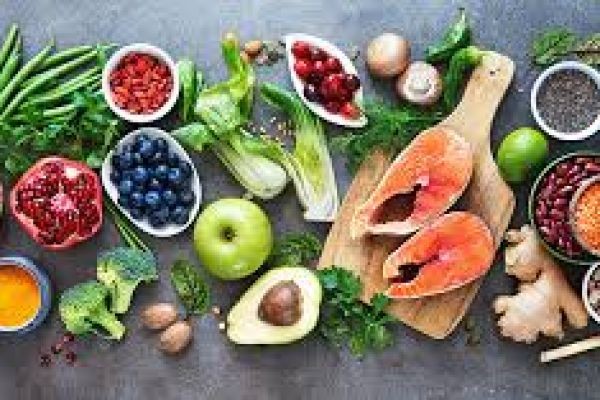1. Blueberries: Antioxidant Powerhouses
Blueberries are often hailed as one of the most powerful superfoods, thanks to their high antioxidant content, particularly anthocyanins. These antioxidants help combat oxidative stress and inflammation, which can protect your cells from damage and reduce the risk of chronic diseases such as heart disease, diabetes, and cancer.
- Health Benefits:
- Boosts brain function and may reduce the risk of age-related cognitive decline.
- Rich in vitamin C, which strengthens the immune system.
- High in fiber, promoting digestive health.
How to Enjoy: Add blueberries to smoothies, oatmeal, or salads, or simply enjoy them as a snack.
2. Kale: A Nutrient-Dense Leafy Green
Kale has long been recognized as a powerhouse of nutrients. This dark, leafy green is packed with vitamins A, C, and K, as well as calcium, iron, and fiber. It also contains powerful phytonutrients, which have been shown to support detoxification processes in the body.
- Health Benefits:
- Supports healthy bones due to its high vitamin K and calcium content.
- Rich in antioxidants, which can reduce inflammation and protect against chronic diseases.
- Aids in digestion and promotes gut health with its high fiber content.
How to Enjoy: Add kale to salads, smoothies, soups, or sauté it with olive oil and garlic for a quick side dish.
3. Chia Seeds: Tiny But Mighty
Despite their small size, chia seeds are packed with omega-3 fatty acids, fiber, protein, and a variety of vitamins and minerals. These little seeds are excellent for heart health, digestive health, and weight management.
- Health Benefits:
- Supports heart health by reducing inflammation and lowering cholesterol.
- Promotes healthy digestion due to their high fiber content.
- Helps stabilize blood sugar levels, making them a great choice for people with diabetes.
How to Enjoy: Sprinkle chia seeds on yogurt, oatmeal, or salads, or make chia pudding by soaking the seeds in almond milk overnight.
4. Avocados: Healthy Fats for Your Heart
Avocados are rich in heart-healthy monounsaturated fats, which help lower bad cholesterol levels and promote cardiovascular health. They also provide a good amount of fiber, potassium, and vitamins like folate and vitamin E.
- Health Benefits:
- Supports heart health by improving cholesterol levels and reducing the risk of heart disease.
- Aids in weight management by keeping you feeling full longer.
- Enhances nutrient absorption from other foods due to their healthy fat content.
How to Enjoy: Enjoy avocados on toast, in smoothies, as guacamole, or added to salads.
5. Quinoa: A Complete Plant-Based Protein
Quinoa is often classified as a whole grain, but it's technically a seed. This gluten-free, protein-packed superfood contains all nine essential amino acids, making it one of the best plant-based sources of protein available. Additionally, quinoa is rich in fiber, iron, magnesium, and manganese.
- Health Benefits:
- Supports muscle growth and repair due to its complete protein profile.
- Aids in digestion and helps regulate blood sugar levels with its fiber content.
- High in magnesium, which supports healthy bones and muscle function.
How to Enjoy: Use quinoa as a base for salads, bowls, or as a side dish, or substitute it for rice in any recipe.
6. Salmon: Omega-3 Fatty Acids for Brain and Heart Health
Salmon is well-known for being one of the best sources of omega-3 fatty acids, which play a key role in heart and brain health. Omega-3s have been linked to a reduced risk of cardiovascular disease, improved cognitive function, and reduced inflammation in the body.
- Health Benefits:
- Supports heart health by reducing inflammation and lowering triglyceride levels.
- Improves brain health and cognitive function, potentially reducing the risk of Alzheimer’s disease.
- Rich in high-quality protein, which is essential for muscle repair and growth.
How to Enjoy: Grill, bake, or pan-sear salmon, and enjoy it with vegetables, in salads, or as a topping for pasta.
7. Turmeric: The Golden Spice of Anti-Inflammation
Turmeric contains a compound called curcumin, which has powerful anti-inflammatory and antioxidant properties. Used for centuries in traditional medicine, turmeric has been shown to have a variety of health benefits, particularly in reducing inflammation throughout the body.
- Health Benefits:
- Helps reduce inflammation, which can alleviate symptoms of arthritis and other inflammatory conditions.
- Supports brain health by improving memory and reducing the risk of neurodegenerative diseases.
- Enhances digestive health by soothing the digestive tract.
How to Enjoy: Add turmeric to soups, curries, smoothies, or even use it to make golden milk (a warm drink made with milk and turmeric).
8. Sweet Potatoes: A Nutrient-Rich Root Vegetable
Sweet potatoes are rich in vitamins A and C, potassium, and fiber. The orange variety, in particular, is high in beta-carotene, which the body converts into vitamin A, supporting eye health and a healthy immune system.
- Health Benefits:
- Supports eye health and immune function due to their high vitamin A and C content.
- Aids in digestion thanks to their fiber content.
- Helps stabilize blood sugar levels with a lower glycemic index compared to regular potatoes.
How to Enjoy: Roast, bake, mash, or fry sweet potatoes, or add them to soups and stews for a nutrient-packed dish.
9. Almonds: Nutrient-Dense Nuts
Almonds are a fantastic source of healthy fats, protein, fiber, and vitamins like vitamin E. These nuts are known for their heart-health benefits and are packed with antioxidants that protect the body from oxidative stress.
- Health Benefits:
- Supports heart health by improving cholesterol levels and reducing the risk of heart disease.
- Aids in weight management by providing a filling, nutrient-dense snack.
- Improves skin health due to their high vitamin E content.
How to Enjoy: Snack on raw almonds, or sprinkle them over salads, oatmeal, or yogurt. You can also use almond butter in smoothies or as a spread.
Incorporating Superfoods into Your Diet
Incorporating these superfoods into your daily meals doesn’t have to be difficult. Start by adding one or two to your regular routine, and experiment with new recipes that highlight their benefits. For example:
- Blend spinach or kale into your smoothies.
- Add chia seeds to your yogurt or overnight oats.
- Enjoy a handful of almonds as a snack.
- Make a hearty salad with quinoa, avocado, and salmon.
The key to reaping the full benefits of superfoods is variety—eating a wide range of nutrient-dense foods will help ensure you get all the vitamins, minerals, and antioxidants your body needs to stay healthy.
Conclusion
Superfoods are an excellent addition to any diet, offering an array of health benefits that can support everything from heart health to brain function to skin health. By incorporating these nutrient-rich foods into your meals, you can enhance your overall well-being and take an important step toward healthier eating habits. Whether you’re looking to boost your immune system, reduce inflammation, or maintain a balanced diet, adding superfoods is an easy and delicious way to get started.










